SOCIAL ECONOMY 4CES
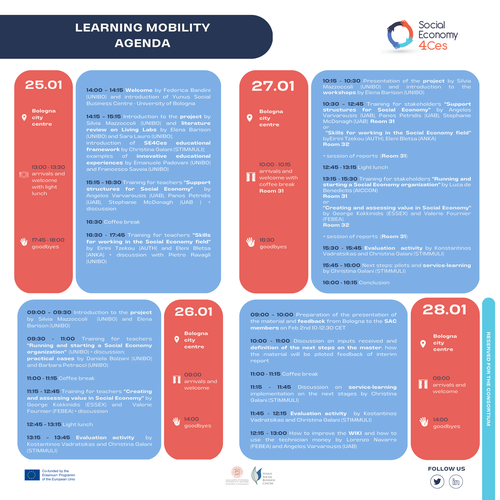
The Learning Mobility Agenda
LEARNING MOBILITY
The Erasmus+ project Social Economy 4Ces (co-teaching, co-produced educational material, service-learning) want to develop innovative teaching methodologies for Social Economy education through a collaborative approach by students, professors and professionals in the field. University of Bologna, University of Thessaloniki, University of Essex, and University of Barcelona, and reserchal institutes such as AICCON, Cooperatives Europe, FEBEA, Stimmuli For Social Change, and Yunus Social Business Centre are actively involved in the project.
University of Bologna will host an international Learning Mobility training programme to explore innovative educational approaches to Social Economy. The meeting will be held from the 25th to the 28th of January 2023.
The idea is to understand what the needs are of people who study and work in this field on a daily basis and to create the first European master's program on the topics of soft skills and support structures to work in the field of Social Economy, Social entrepreneurship and Impact Evaluation.
Two years after the project began, each University want to share the results achieved so far. Results that, in the case of University of Bologna, have been acquired through several co-creation workshops held at the Department of Business Sciences in Forlì and attended by multiple stakeholders (students, faculty and Social Economy professionals). New teaching approaches to be adopted in the classroom, such as role-playing, problem-solving approach, podcasts and gamification, were envisioned during these opportunities for discussion. The next step for each University participating in the project will be to test these new methodologies in the classroom.
Before starting with the testing phase, the Learning Mobility will offer professors and professionals the opportunity to discuss the designed methodologies with stakeholders from across Europe, giving them the chance to improve the designed tools, assimilate innovative teaching approaches and adopt original content for the Social Economy.
It will also be an opportunity to discuss the structure and content of the Joint Online Master's Program on "Social Economy and Community Development Strategies" created from stakeholder input and the SE4Ces Wiki platform, which will be one of the supporting tools for the online master's program.
The Learning Mobility event will be divided by areas of interest: the first two days will be dedicated to teachers, with a specific focus on teaching methodology; while the third day will be reserved for training social economy professionals on the topics of soft skills and support structures for working in the field of Social Economy, Social entrepreneurship, creation and impact Evaluation.
Read more: https://lnkd.in/gQSs_RFT
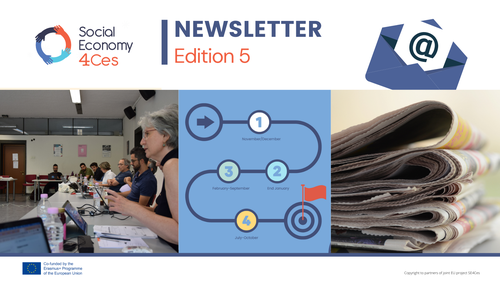
SE4Ces project preliminary results approved
We are halfway into the SE4Ces project. In September we met with the Scientific Advisory Council to take stock of the first project results. The Advisory Council considered the work done fantastic, reflecting on the variety of contexts surrounding social economy and the diversity in interpretations across Europe. They advised us on every step of the project on how to proceed to make the produced materials as comprehensive as possible.
One key output of the project is the prototype version of our Wikipedia page which collects educational materials on the social economy and aims to facilitate the development of a community of practice including researchers, teachers, social economy organisations, and policymakers.
More generally the project now advances closer to the actual on-the-ground testing in which teachers, trainers, SE organisations, and students for Living Labs will participate. Before we arrive there, we have many other preparatory meetings in store in which you can participate. For social economy organisations, we are providing a unique opportunity to contribute to the way in which social economy will be taught.
Learn more about all of this:
Read the SE4Ces newsletter here
Subscribe to the SE4Ces newsletter here
RESEARCH PARTNERS
University of Bologna; AICCON; Aristotle University of Thessaloniki (Greece); Stimmuli for Social Change (Greece); Anaptyxiaki Karditsas Anaptyxiaki Anonimi Etairia O.T.A. (Greece); University of Bristol (UK); Federation Europeenne de Finances et Banques Ethiques et Alternatives (Belgium); Cooperatives Europe asbl (Belgium); Universitat Autonoma de Barcelona (Spain)
TEAM
Federica Bandini, Carolina Graffi, Francesco Savoia, Elena Barison, Silvia Mazzoccoli
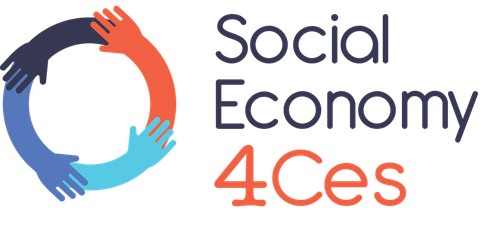
BACKGROUND AND GENERAL OBJECTIVE
Joining Social Economy forces towards Community development, Connected societies, Co-creation of knowledge, Collaborative education practices. Social Economy’s potential is still untapped. Education on Social Economy in Higher Education Institutions (HEIs) is still largely absent. Where it does exist, it remains largely theoretical, failing to connect students with their communities and real-world learning experiences. Our mission is to boost the transformative potential of Social Economy in Europe by disseminating the professional skills needed in the context of social economy. The project will proactively mobilize students, faculty and staff, social entrepreneurs, networks and local communities to improve the connection between these stakeholders in order to co-develop collaborative educational practices.
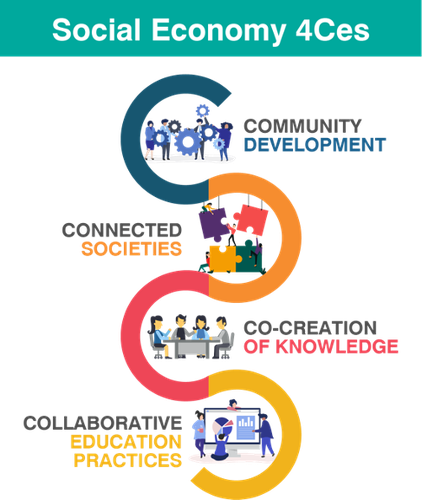
ACTIVITIES AND METHODS
PHASE 1: Providing an overview of the current Social Economy education landscape and analyse the needs in training and skills in SE organisations. Adopted method:
- Desk-research on Social Economy courses in Italy, Greece, France, UK and Spain, with focus on contents, teaching methods, collaboration with social economy stakeholders.
- 65 Interviews with professors, students and social economy stakeholders in Italy, Greece, France, UK and Spain, asking for an evaluation of different social economy degree and training courses in Italy and other partner countries.
PHASE 2: Design and Pilot of Social Economy Living Labs in 4 EU countries – spaces for interaction, collaboration and knowledge co-creation connecting HEIs, students, organisations and communities. Adopted method:
- 100 surveys submitted to professors, students and social economy stakeholders in Italy, Greece, France, UK and Spain, asking for an expression of their interest in different innovative teaching methods that could be implemented in social economy courses in the future.
- Co-creation workshops on innovative content and methods to include in Social Economy study programmes. Students, teachers, stakeholders and professionals come together and discuss solutions on how to improve the educational offer of SE courses.
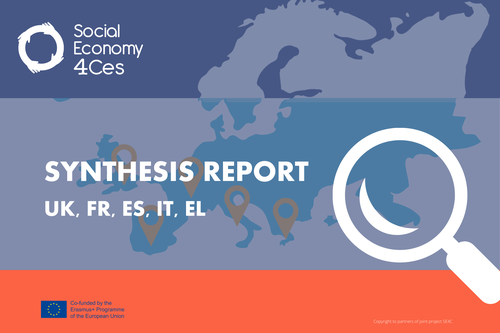
READ THE FIRST RESULTS of the state-of-the-art and need-analysis in Italy, Greece, France, UK and Spain.
The synthesis report provides a comprehensive review of educational provisions on the Social Economy (SE) across 5 countries (UK, France, Spain, Italy and Greece) and sets the foundations for understanding the ways in which an SE programme could be designed to meet the needs of various relevant actors (in particular, educators, students and organisations).
Our findings suggest that most programmes are quite general in terms of their focus on social economy or social entrepreneurship, with SE actors expressing an increasing appetite for more specialised courses which makes the development of new programmes with an explicit focus on social and solidarity economy strongly advisable.
Collaborations between Higher Education Institutions (HEI) and SE actors take different forms, yet they tend to be at the delivery stage rather than in the development of the programmes or the co-creation of knowledge, hence the role of SE actors in the designing and delivery of these programmes could be strengthened. Existing provisions do offer a range of innovative practices and any new programmes should build on, and expand, these practices. New programmes should provide a good balance between theory and practice, be flexible in their modes of delivery, create opportunities for networking, and have a strong grounding in SE values whilst being open enough to attract a variety of different audiences and adapt to different and changing environments.
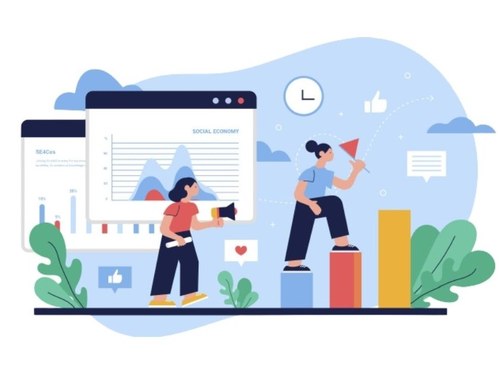
ROAD TO SOCIAL ECONOMY LIVING LABS
Social Economy Living Labs are partnerships operating on the basis of SE principles between HEIs (in the field of SE), SE organisations, SE students and community actors aiming to co-create and offer educational materials and innovative methods of collaborative teaching that will leverage the full potential of the SE sector towards community development. The Living Labs will be built on 3 pillars:
- Co-creation of knowledge and educational material means that social economy professors/educators create the educational material and the curriculum of the study programme in collaboration with social economy professionals working in the field, as well as the students themselves.
- Co-teaching and participative teaching and training means that professors/educators in social economy are delivering classes or activities together with SE professionals and students play an active role.
- Service-learning is a short internship of students in SE organizations on a voluntary basis. Students join SE organisations for a short period of time and provide services for the benefit of the community through the specific SE organizations. The aim is to improve transversal skills and connect with community.
Follow us and STAY UPDATED!
On the SE4Ces Twitter profile or following the hashtags #SE4Cs #SE4Ces #socialeconomy4ces.
On the YSBC LinkedIn profile or following the hashtags #SE4Ces #SE4Cs #socialeconomy4ces.